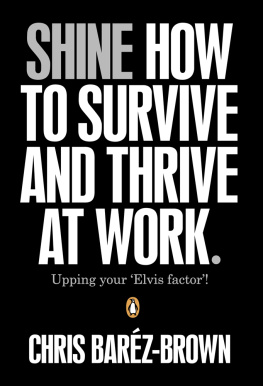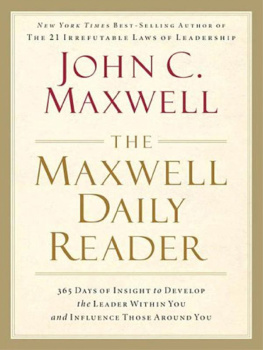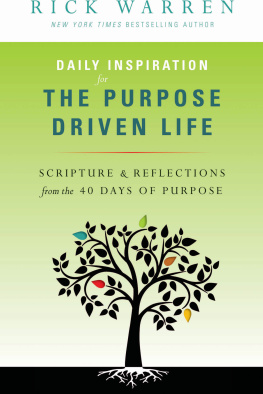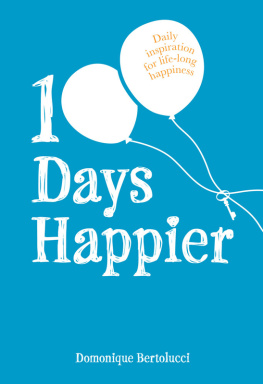Return:
Daily Inspiration for the Days of Awe

Erica Brown
RETURN
DAILY INSPIRATION
FOR THE DAYS OF AWE
Maggid Books and OU Press
Return: Daily Inspiration for the Days of Awe
First Edition, 2012
Second printing
Maggid Books
An imprint of Koren Publishers Jerusalem Ltd.
POB 8531, New Milford, CT 06776-8531, USA
& POB 4044, Jerusalem 91040, Israel
www.korenpub.com
OU Press
An imprint of the Orthodox Union
11 Broadway
New York, NY 10004
www.oupress.org
Erica Brown 2012
The publication of this book was made possible through
the generous support of Torah Education in Israel.
The right of Erica Brown to be identified as the author of this work has been asserted by her in accordance with the Copyright, Designs & Patents Act 1988.
All rights reserved. No part of this publication may be reproduced, stored in a retrieval system or transmitted in any form or by any means, electronic, mechanical, photocopying or otherwise, without the prior permission of the publisher, except in the case of brief quotations embedded in critical articles or reviews.
ISBN 978 159 264 3639, hardcover
A CIP catalogue record for this title is
available from the British Library.
Printed and bound in the United States
Come, let us reach an understanding, says the Lord. Be your sins like crimson, they can turn snow-white; Be they red as dyed wool, they can become like fleece.
(Isaiah 1:18)
To my students,
who constantly show me
the meaning of growth and change,
and make all darkness white and pure.
In Loving Memory of Our Parents
Joseph and Gwendolyn Straus

Dedicated by
Moshael and Zahava Straus
Daniel and Joyce Straus
Contents
OU Press is proud to join with Maggid Books in co-publishing Erica Browns sensitive and searching exploration of the world of teshuva.
For many, Maimonides classic, The Laws of Repentance, gives structure to the emotional, psychological, intellectual, and religious components of teshuva, and serves as a wellspring of understanding for teshuva. Dr. Brown includes selections from The Laws of Repentance in each chapter of this excellent book. In her Preface, she mentions the custom of studying one of the ten chapters of The Laws of Repentance on each day of Asseret Yemei Teshuva. Teshuva is a goal; it comes in stages, intermittently. Our daily study reflects this concept of teshuva as an incremental process. Rabbi Joseph Soloveitchik, the towering rabbinic authority of the twentieth century, notes this custom with approval in his Al HaTeshuva, and relates that his father, as well as his grandfather, the famed Rav Hayim of Brisk, studied one chapter of The Laws of Repentance on each day of Asseret Yemei Teshuva. Rabbi Soloveitchik speculates that the division of the work into ten chapters may well have been a deliberate allusion by Maimonides to the ten days of Asseret Yemei Teshuva.
Maimonides highlights the unique quality of Asseret Yemei Teshuva: Even though any time is appropriate for teshuva and prayer, during the ten days between Rosh HaShana and Yom Kippur teshuva is more appropriate, and it is accepted immediately. In one of the most lyrical passages in all of halakhic literature, Maimonides describes the power of teshuva: How wonderful teshuva is, that it brings one close to the Divine Presence. Teshuva brings close those who are far away. Only yesterday he was loathed by the Almighty, repulsive, distant, and despicable; and today he is beloved, pleasing, close, and dear. How lofty and exalted is the power of teshuva. Only yesterday he was separated from the God of Israel, crying out to no avail, and today he cleaves to the Divine Presence, cries out, and is answered immediately. It is this magical transformative gift of teshuva which Dr. Brown so effectively helps us grasp.
Erica Brown has had an exceptional impact on the Jewish scene. With her rare ability to convey the wisdom of our sages to a contemporary audience, she has raised an awareness of Jewish learning that is striking. We are indebted to her for this book, in which she gives us the tools to navigate the process of teshuva during the time between Rosh HaShana and Yom Kippur, a time suffused with hope and promise.
We wish to thank Moshael and Zahava Straus and Daniel and Joyce Straus for their generous sponsorship of this book.
Menachem Genack
General Editor, OU Press
W e are embarking on a quest into the self during the ten days between Rosh HaShana and Yom Kippur the Asseret Yemei Teshuva. Difficult work lies ahead.
Believing the words of our prayers during this season namely that repentance, prayer, and charity annul the evil decree many people have the custom of intensifying their good works and charitable impulses during these ten days. It is customary to increase ones performance of mitzvot and study during this period. Some people are even more scrupulous in their kashrut observance. While cynics may think this is just hedging ones bets, we all recognize the importance of building up spiritual muscle with enhanced use during a period of judgment. Good habits breed better habits and have a spillover effect from one day to the next. Whatever we can do to stimulate greater piety, introspection, and goodness will help us in the coming year to be more loving, more pious, more thoughtful, and more kind.
The pages ahead contain food for thought (even when were fasting) for each of these ten days. Each day offers an essay on a biblical or rabbinic theme related to self-improvement and presents Life Homework, a behavioral charge to help us exercise that muscle practically. Each chapter ends with text questions on three passages for study that span almost a thousand years of Jewish learning. The first comes from The Laws of Repentance written by Maimonides (11351204); the ten chapters in The Laws of Repentance inspired many people to study one chapter a day for these ten days. The second passage is from The Path of the Just by Rabbi Moshe Haim Luzzatto (17071746). The third source is The Lights of Repentance, written by Rabbi Abraham Isaac HaCohen Kook (18651935). The texts gathered in the study section and throughout embody thousands of years of thinking and dreaming about what it means to become a better person in Jewish tradition.
Many works of self-improvement cited in the pages that follow surfaced during the Musar movement, a nineteenth-century ethical/behavioral crusade that spread throughout Eastern Europe largely in response to the over-intellectualization of Judaism. Teshuva means return. Musar means turn. Both filter into Jewish writings to reflect a profound desire to fix that which is broken, repair relationships, and strengthen intimacy with God.
Teshuva, the belief and the mandate that we really can and must change, is one of the greatest gifts that Judaism gave the world. And it is one of the greatest gifts we can give ourselves, one that demands hard internal work because teshuva requires good decision-making. The poet Robert Browning once bemoaned the difficulty of making decisions: Lifes business being just the terrible choice. But choose we must: every word we say, every small gesture, every action is a decision that has a causal impact on the next decision. Every day, three times daily according to tradition, we pray for forgiveness, appealing to God as both parent and judge: Forgive us, our Father, for we have sinned. Pardon us, our King, for we have transgressed, for You pardon and forgive. Blessed are You, Lord, the gracious One who repeatedly forgives. We repeatedly sin so we ask that God repeatedly forgive. We make a daily habit of asking for Gods pardon. But at this time of the year, we ask that God give us the wisdom and strength to make good decisions so that our repeated pattern of moral weakness and apology will finally be broken.
Next page











